Whether you’re greening up your patio or creating interest in a flower bed, using planted containers is an easy way to to add texture and depth to your outdoor space. But creating a beautiful container garden isn’t as simple as plopping a few plants into a pot. Here are nine tips for creating a truly artful container garden.
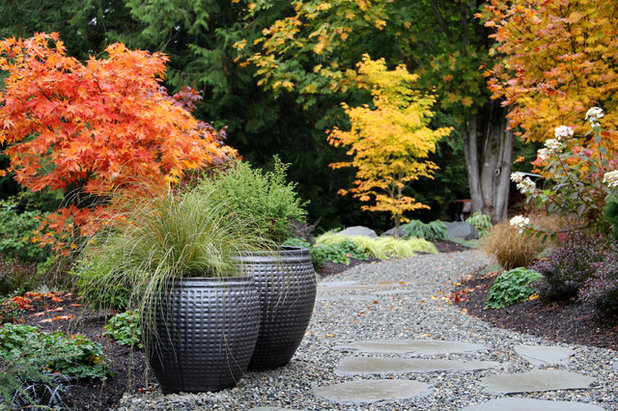
Bliss Garden Design
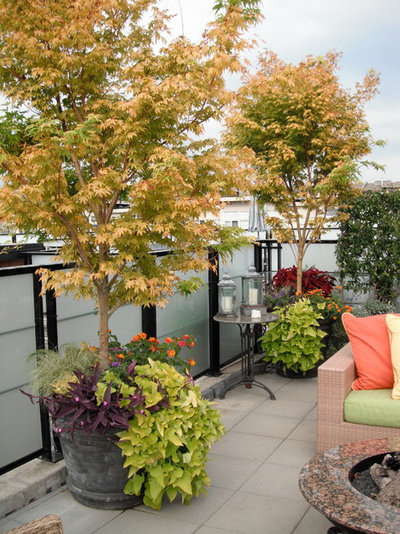
Glenna Partridge Garden Design
1. Keep pots simple. “I try to limit colors/glazes to one or two for each garden area,” says Tish Treherne of Bliss Garden Design.
2. Set a tone. Think about your garden’s style. Is it traditional? Modern? Asian? Choose containers that reflect that theme.
Find your garden style
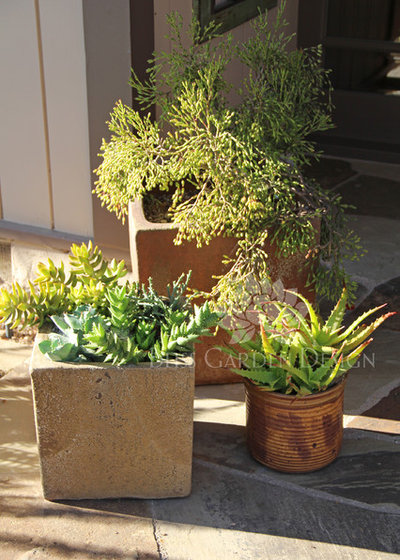
Bliss Garden Design
3. Think of pottery as sculpture. Pottery comes in a startling array of shapes, sizes, glazes and colors, and can be employed to add an artistic element to your garden.
“When selecting glaze and color, I also consider the garden setting,” says Treherne. “For instance, I might be tempted to use a chartreuse glaze in a shaded garden with monochromatic greens or a copper red in a warm and sunny garden. I may also consider hardscape — for instance, in this garden the pottery echoes the surrounding stone.”
Some pots can be left empty as sculptural elements. “For pots that I know I will not plant, I usually look for ones that are smaller at the top/opening than the middle,” she says. “A more open top begs to be planted.”
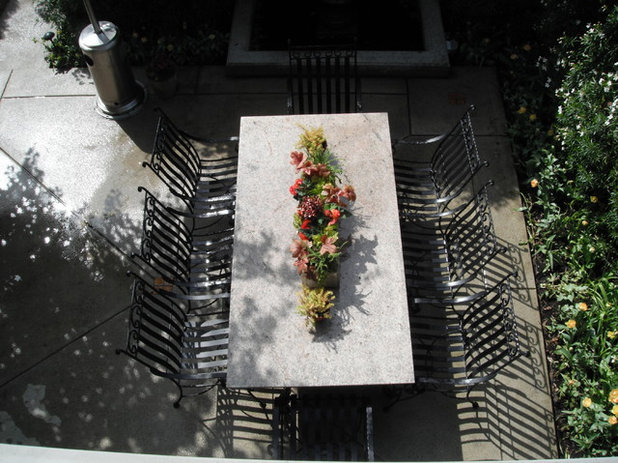
Glenna Partridge Garden Design
4. Build your color scheme around one specific plant. Glenna Partridge of Glenna Partridge Garden Design suggests starting with a plant you love when choosing plantings. “I specifically use the foliage or flower color as my jumping-off point,” she says.
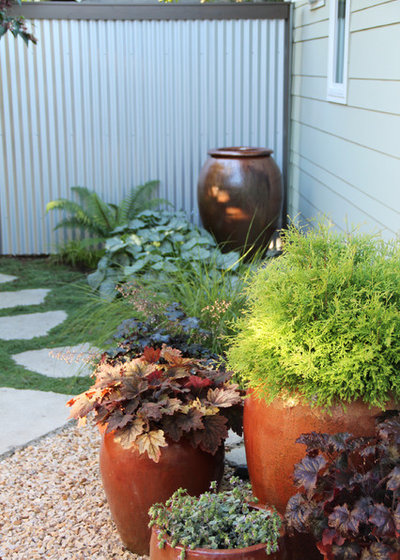
Bliss Garden Design
5. Play with plant groupings. Decide whether you’d like to use single plantings or create a grouping of plants in each pot. “With the exception of succulent plantings, I have found that I prefer one plant per pot rather than elaborate displays. I then group pots together. This creates a cleaner look and is lower maintenance,” says Treherne.
There’s no right or wrong; it’s simply a matter of personal preference.
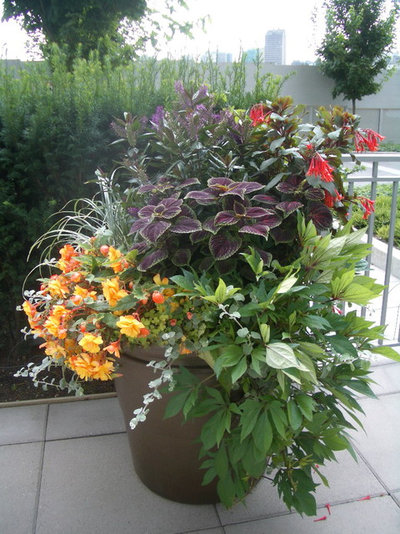
Glenna Partridge Garden Design
If you do choose to use multiple plants in one container, Partridge advises to pack them in. “As long as you have a good-sized container — 22 to 36 inches — and fertilize weekly, they will be happy,” she says.
And while you should definitely consider the three components of a container plant grouping (thriller, filler and spiller), you also shouldn’t be afraid to veer from an exact formula. “You might just have one large plant in the container with trailing spiller plants,” says Partridge.
The formula for grouping plants in a pot
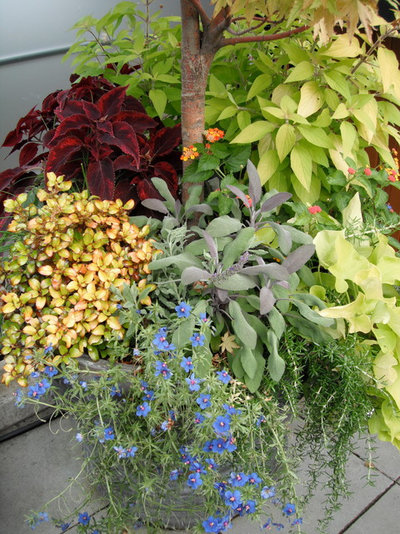
Glenna Partridge Garden Design
6. Add impact with color. Decide whether you’d like to take a minimalist, monochromatic approach or incorporate color. “If you want high-impact color, use opposites on the color wheel, such as blue with orange,” advises Partridge.
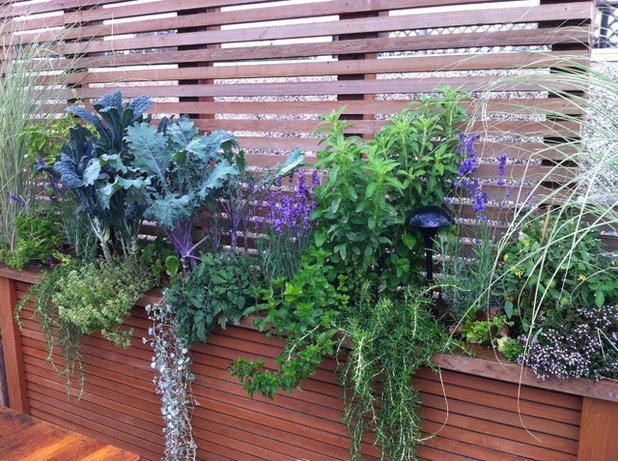
Glenna Partridge Garden Design
7. Use foliage to add texture. Whether you’re creating a grouping of single-plant containers or planting multiple species in one pot, mixing foliage types will help add interest through texture. Partridge suggests mingling plants with broad leaves and finer-leaved plants for contrast.
How to mix plant textures to catch the eye
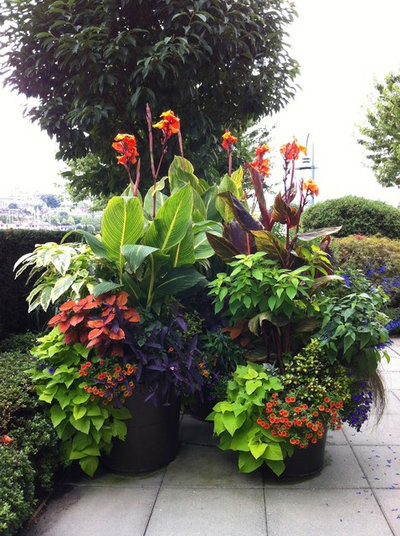
Glenna Partridge Garden Design
8. Experiment with height and scale. “I think if more gardeners planted with scale in mind, they would have better results,” says Partridge. Using a few large containers will create more impact than a grouping of tiny ones, particularly in medium-size and large spaces.
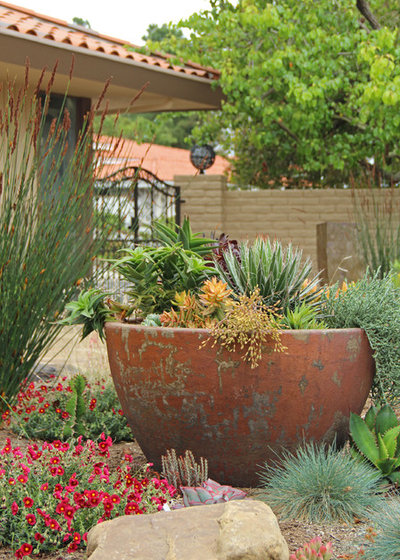
Bliss Garden Design
9. Place pots in existing beds. This is a great way to use pots as a sculptural element, but choosing which plants to place inside each vessel can be tricky. Treherne takes a location- and climate-specific approach.
“For instance, if it’s an area where the pottery is making a statement, I might use a more unusual plant to catch the eye,” she says. “In general, though, I am thinking about performance over time. There are some plants that just do well in pots.”
As a general rule of thumb, Treherne suggests avoiding plants with high water needs and using varieties suited for your climate.
More: How to get the right soil mix for your container garden





